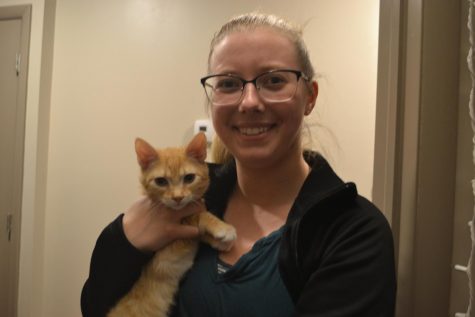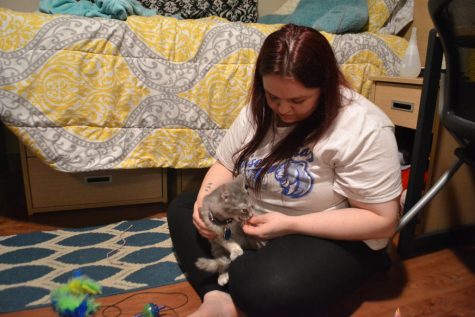Amiable Animals Support Owners



Special furry creatures on campus are doing wonders for their owners by acting as emotional support pets.
Amy Disher, a sophomore biology pre-med major, has a four-and-a-half-month old cat that she named Oliver, inspired by the Disney movie Oliver and Company.
Although social and friendly now, Disher found Oliver dying on the side of the road before she chose him as her emotional support animal.
“He was the perfect fit for me,” she said.
Kristen Ricardo, Assistant Director of the Student Success Center and Office for Students with Disabilities, said students should go to her office if they think they qualify for one.
“If a student wants an emotional support animal, they can’t just bring the animal right to campus. They have to officially register the animal with the Office for Students with Disabilities, because we do have a process in place for students to do that,” said Ricardo.
Ricardo said that the university has policy regarding emotional support animals, but the main thing students need to remember is to bring some very specific documentation.
“A student has to have a diagnosis from a qualified professional, and the emotional support animal has to be recommended as part of the treatment for their diagnosis. Along with that, we usually look for additional documentation. Since pets are not allowed on campus, especially in the dorms, for them to have their prescribed emotional support animal we want to make sure that we are hearing from the qualified professional about how this animal is part of your recommended support for your diagnosis,” said Ricardo.
Some basic rules and regulations apply to owning an emotional support animal, the most important being the ability to care for one. No one other than the approved student, including roommates, are allowed to clean up after, feed or take care of the animal. However, rules on animal type and size have yet to be finalized.
“There are no specifics. This is covered under the Fair Housing Act and right now it’s very gray. There are no specific requirements. Right now there are no guidelines for us to follow, but we hear that those might be coming. Obviously we would like to possibly put a size requirement in the future,” said Ricardo.
Ricardo and her staff said students have already made requests for a variety of animals, from a dog and a cat to a snake.
“Unlike a service animal, that can only be a dog or a miniature horse, an emotional support animal can really be any animal so long as they ease the symptoms of the diagnosis,” said Ricardo.
Ricardo said the university must also consider the feelings of roomates when a student goes through the support animal approval process.
“We take a collaborative approach and have a student agreement form. They can still bring the animal. However, we still want to make sure the individual is communicating with the roommates. We like to have all the roommates to sign-off and that’s our first opportunity to talk.”
Riccardo said all involved must reach agreement if, for example, a student comes forward who is allergic to, say, cats.
“Because there is no clear option, we do not assume we should automatically move the roommate with the allergy or the roommate with the cat out. We just talk about different options,” said Ricardo.
Sometimes Ricardo works alongside Residence Life to move willing students in such a situation.
No matter what, Ricardo stresses the responsibilities of emotional support pet owners. In addition to providing care, owners must confine the animal to the owner’s residential space. In dorms like McHale and McGowan, this may mean only the owner’s room, but in the Townhouses and places with common areas within the same residential area, roommates will have to be okay with it.
Shania Kane, a junior speech-language pathology major, adopted her emotional animal, a six month old cat named Sloan from the television show, Grey’s Anatomy. Kane said one of the hardest parts of owning an emotional support animal is having to train her by herself.
“Also, I love having her and she helped me a lot, but she does wake me up in the morning,” said Kane.
Kane said the approval process was not difficult, but the transfer of paperwork was laborious.
“I had to transfer paperwork from the doctor to the campus. I was just back and forth,” said Kane.
Kane’s advice to students who may want emotional support animals, or any other campus service, is to not be afraid.
“Don’t be afraid of getting the resources you need because those people are there to work with you and help you. So just take advantage of what you can do for yourself to help yourself,”Kane said.
Disher said the hardest things about having Oliver is leaving him alone to go to classes, keeping him from drinking her coffee and keeping him off of her keyboard when she is typing. Most mornings, Oliver is partially asleep on Disher’s face when she wakes up.
Disher advises prospective emotional support animal owners to do the necessary paperwork and be sure to accept the responsibility that comes along with any animal.
Students who need and are qualified for the service can contact the Office for Students with Disabilities to inquire about getting an emotional support pet.
